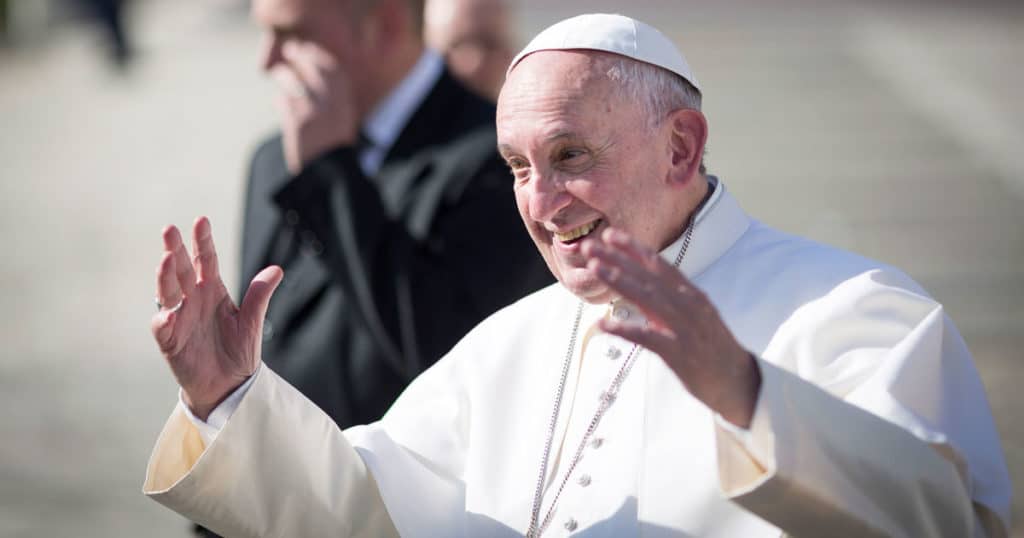Have you ever picked up Pope Francis’s book, Misericordiae Vultus? Like you’d expect, it’s filled with classic Pope Francis quotes, but even more than that, it’s smashing. It’s smashing most of my ideas about the limitations of mercy. I thought I just had to forgive seven times seventy. But in some instances, relationships in particular, I’ve actually started counting.
Turns out the actual name of God is Mercy and that raises things to another level for us as single Catholic men and women.
Really, though, what does that mean? What we all want from a Papal interview-turned-book is practical advice. Enough of what we believe, what should we DO? As we strive to lvie in a spirit of mercy, I’ve applied some of his core ideas to relationships, a pretty common arena for practical advice. Here’s what I learned:
Look for the smallest opening for compassion
First, look for the smallest opening, because that’s what God does. If there’s someone you really like and there’s some difference that is tearing you apart—like who should be president—don’t count on an overnight conversion. Be patient and look for the smallest opening, if the relationship is worth salvaging. That’s what God does with us. We like sin. God doesn’t; but He thinks it’s a relationship worth saving and he looks for the smallest opening.
Pulling from a novel, “To Everyman A Penny”, the Pope relates the story of a confessor and a soldier sentenced to death who can’t imagine giving up his amorous “dating” adventures. We all know that person. I don’t mean the sentenced to death part.
“But are you sorry you’re not sorry?” the confessor asks in a last attempt to give absolution.
“Yes!” the soldier responds. There was a small opening and something they could both agree on. We know how that story ends.
The corrupt are more dangerous than the sinner
With the various scandals occurring among priests, bishops, and throughout our Catholic church, Pope Francis may have had some people in mind when he wrote on this topic (cough, cough).
Pope Francis warns us to beware of the corrupt more than the sinner. Guys are notorious for scandalizing the world with their sins and ladies are well known for holding it against them. That all happens vice versa also, I’m just making a gross stereotype.
I think at the heart of the matter, though, is the need to ask yourself, “Is this person actually corrupt, or just a sinner?” Although we want to focus on how this applies to men and women in a relationship, we can’t help but look at how this applies to our priests and bishops within the church as well. Many of our priests who are caught up in scandal are simply sinners. Of course, there are also those who are corrupt.
Back to our relationships…
There’s a difference; and be you man or lady, if you toss the sinners off your riverboat you will be cruising solo for a very long time. We are all called to be holy, but very few of us can really claim to be holy, right?
So how does Pope Francis distinguish between the corrupt and the sinners? Haha, good try, read the book and find out.
Less “either…or” and more “and…also”. Often, we take a hard lined approach of categorizing people as we do sins—venial, mortal. That person’s “outside the Church”, “not in the state of grace”, “This person is”. That’s the either…or mentality. The man in white from the Vatican reminds us to consider where people are before judging them.
“For some people either because of the condition in which they find themselves or because of the human drama they are living, a small step, a small change, means a great deal in the eyes of God.”
This is the “and…also” approach. Someone is a sinner and is trying to improve their life.
If you live a relatively stable, provided life and pride yourself on being a practicing Catholic, don’t be so quick to judge other people coming from much harsher conditions. You might be surprised at who impresses God more, you or them.
Pope Francis is all about mercy
Pope Francis doesn’t attempt to redefine sin with his new book, he just attempts to embrace the sinner. That’s not always easy and certainly not in the close proximity of a relationship—dating or marriage. If you’re not 100% satisfied with your relationship, however, maybe it’s time to try something new. Have a little more mercy. The worst that could happen is that most likely you’ll see your social circle grow and options increase because now you can let the not-so-perfect in. You’ll enjoy being able to see those close to you in a more positive light. Finally, you’ll start to be nicer to yourself, as well, since odds are you’re a sinner too, with moral errors from time to time. The Name of God is Mercy, give it a shot.



